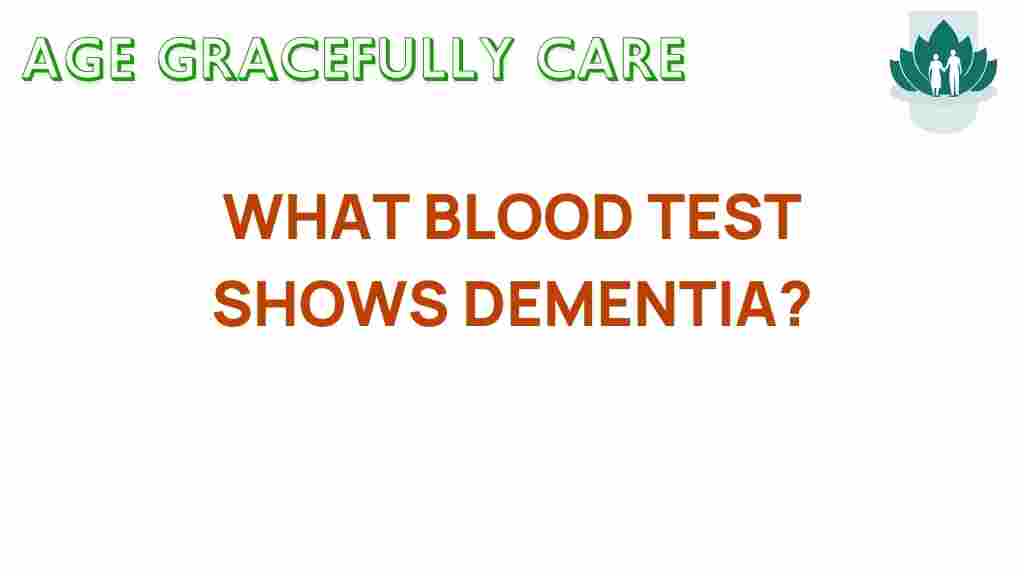Unraveling the Mystery: What Blood Test Reveals Dementia Risk?
Dementia is a growing concern in our society, affecting millions of individuals and their families. As medical research advances, the focus on early detection of dementia has become paramount. One of the most promising avenues in this quest is the development of blood tests that can indicate the risk of neurodegeneration. In this article, we will explore the connection between blood tests and dementia, highlighting the importance of cognitive health, early detection, and the latest findings on biomarkers associated with Alzheimer’s disease.
Understanding Dementia and Its Impact
Dementia is an umbrella term for a range of cognitive impairments that affect daily functioning. Alzheimer’s disease is the most common form of dementia, accounting for 60-80% of cases. The symptoms can include:
- Memory loss
- Difficulty in communication
- Challenges with reasoning and problem-solving
- Changes in mood and behavior
The emotional and financial toll of dementia is immense, making early detection critical. Understanding how blood tests can provide insights into dementia risk is essential for proactive healthcare.
The Role of Blood Tests in Dementia Detection
Recent advances in medical research have shown that certain biomarkers present in the blood can help predict the risk of developing Alzheimer’s and other forms of dementia. These biomarkers can indicate neurodegeneration even before clinical symptoms appear, allowing for:
- Earlier intervention and treatment
- Better management of cognitive health
- Informed decision-making for patients and families
Key Biomarkers Associated with Dementia
Several key biomarkers have been identified through extensive research. These include:
- Amyloid-beta: A protein that forms plaques in the brains of Alzheimer’s patients.
- Tau protein: Associated with neurofibrillary tangles found in the brains of those with Alzheimer’s.
- Neurofilament light chain (NfL): This protein can indicate neuronal damage and has been linked to various neurodegenerative diseases.
- Inflammatory markers: Chronic inflammation in the brain may also play a role in the development of dementia.
These biomarkers can be measured through a simple blood test, providing a non-invasive method for assessing dementia risk.
How Blood Tests for Dementia Work
The process of using blood tests to assess dementia risk involves several key steps:
- Consultation with Healthcare Provider: If you or a loved one is experiencing cognitive decline, the first step is to consult with a healthcare professional. They will evaluate symptoms and recommend appropriate tests.
- Blood Sample Collection: A healthcare provider will draw blood, typically from a vein in your arm. This process is quick and usually involves minimal discomfort.
- Laboratory Analysis: The blood sample is sent to a laboratory where it is tested for specific biomarkers associated with dementia.
- Results Interpretation: Once the results are available, your healthcare provider will discuss them with you, explaining what the biomarkers indicate regarding your risk for dementia.
This method of early detection through blood tests is a significant advancement in the field of cognitive health.
Benefits of Early Detection
Early detection of dementia through blood tests offers numerous benefits:
- Informed Decision-Making: Understanding your risk allows for better planning and decision-making regarding future care.
- Access to Treatments: Some treatments may slow the progression of dementia if started early.
- Support for Families: Families can prepare emotionally and financially for the future based on the risk assessment.
Challenges and Limitations
While blood tests for dementia show great promise, there are challenges and limitations to consider:
- Interpretation of Results: The presence of biomarkers does not guarantee that a person will develop dementia; it only indicates increased risk.
- Availability: Not all healthcare facilities may offer these tests or have access to the latest research.
- Ongoing Research: The field is evolving, and more research is needed to fully understand the implications of blood test results.
It is essential to approach these tests with a clear understanding and to discuss any concerns with a healthcare provider.
What to Expect After Testing
Once you have undergone a blood test for dementia risk, here’s what you can expect:
- Follow-Up Appointments: Schedule follow-up appointments to discuss the results and any additional testing that may be necessary.
- Further Assessments: If results indicate a high risk, your healthcare provider may recommend further cognitive assessments or imaging studies.
- Implementation of Lifestyle Changes: Depending on your risk level, your provider may suggest lifestyle modifications to support cognitive health, such as diet, exercise, and mental stimulation.
How to Maintain Cognitive Health
Regardless of your test results, taking proactive steps to maintain cognitive health is crucial. Consider the following:
- Engage in Regular Physical Activity: Exercise promotes blood flow to the brain and can support overall brain health.
- Follow a Brain-Healthy Diet: Diets rich in antioxidants, healthy fats, and low in processed sugars can help mitigate cognitive decline.
- Stay Mentally Active: Engage in puzzles, reading, and learning new skills to keep your brain challenged.
- Socialize: Maintaining social connections can help improve cognitive resilience.
- Prioritize Sleep: Adequate sleep is essential for overall health and cognitive function.
By implementing these strategies, you can support your brain health and potentially reduce your risk of dementia.
Conclusion
Blood tests represent a groundbreaking advance in the early detection of dementia and Alzheimer’s disease. By identifying biomarkers associated with neurodegeneration, these tests offer a glimmer of hope for those at risk. While challenges remain in interpreting results and ensuring widespread access to testing, the potential benefits of early detection cannot be overstated. As medical research continues to evolve, we must stay informed and proactive about our cognitive health.
For more information on dementia testing and healthcare advancements, you can visit this resource. Additionally, if you’re interested in learning about other cognitive health strategies, check out this article.
In summary, understanding what a blood test reveals about dementia risk is crucial for anyone concerned about cognitive health. With early detection, informed decisions, and proactive health management, we can navigate the complexities of dementia more effectively.
This article is in the category Health and created by AgeGracefullyCare Team
